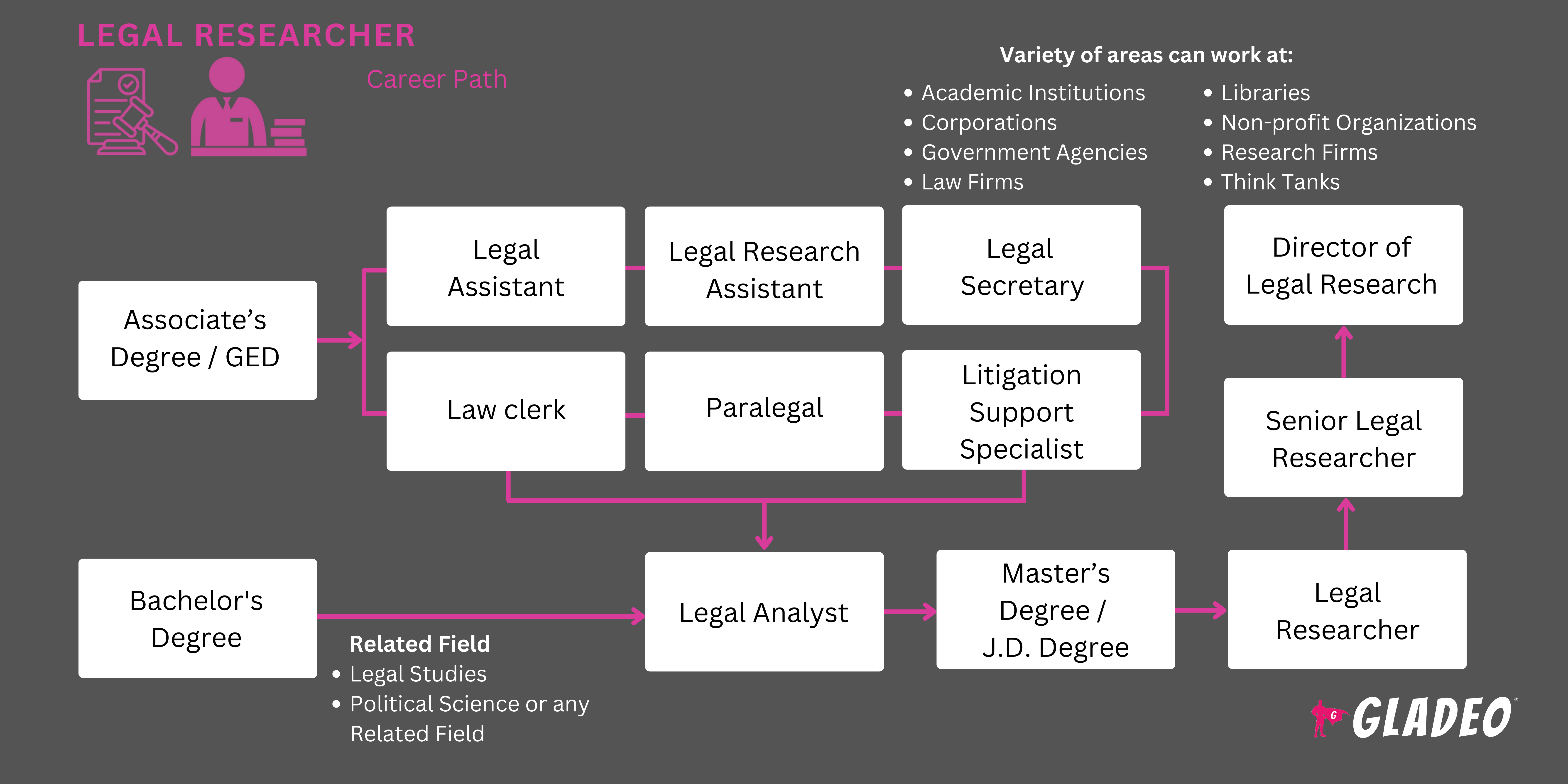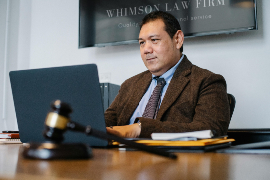스포트라이트
Law Clerk, Legal Analyst, Legal Research Specialist, Legal Research Assistant, Legal Researcher/Writer, Legal Research Consultant, Legal Research Associate, Legal Information Specialist, Legal Research Librarian
Legal Content Specialist, Legal Investigator
Attorneys get paid a lot of money by their clients because they’re expected to win legal battles! But winning in court is no easy task. Many cases are incredibly complicated, requiring vast amounts of research and preparation. Often there’s too much work for a single attorney, which is when they turn to Legal Researchers for support.
Legal Researchers dive into case law and other materials to find information attorneys can use to devise strategies. They may work with Law Librarians and other professionals to comb through statutes, casebooks, court opinions, records, regulations, databases, and legal “fine print.”
These researchers, sometimes called law clerks, may work in law schools, private firms, corporate legal departments, government agencies, and other settings. Although they are behind the scenes, their efforts often make the difference between winning and losing a case.
- Helping others locate pertinent legal information
- Enabling access to accurate legal resources
- Supporting attorneys’ work to improve their odds of winning cases
- 역동적이고 지적으로 자극적인 환경에서 일하기
근무 일정
- Legal Researchers typically work full-time office hours, with overtime possible. They may have to travel to obtain physical materials.
일반적인 의무
- Conduct thorough legal research using statutes, codes, casebooks, court opinions, rules, records, regulations, journals, handbooks, databases, and dictionaries
- Analyze and summarize legal information to support attorneys in preparing for trials, hearings, and depositions
- Prepare legal research reports, memoranda, briefs, and other documents
- Work closely with attorneys, providing expert insights and recommendations
- Review legal catalogs and stay updated with new resources
- Borrow materials from libraries to supplement research resources
- Traveling to various sites to obtain legal documents or materials
- Maintain strict confidentiality of sensitive legal information and adhere to ethical standards
추가 책임
- Train and supervise assistants, staff, and volunteers, as needed
- Stay current with developments in legal research techniques and technologies
소프트 스킬
- 적응성
- 분석
- 세부 사항에주의
- 합작
- 의사소통 기술
- 조정
- 비판적 사고
- 의사 결정
- 이니셔티브
- 대인 관계 기술
- 조직 기술
- 지각
- 문제 해결
- 연구 기술
- 건전한 판단
- 시간 관리
기술 능력
- Ability to analyze legal documents and regulatory information
- Familiarity with court docket systems
- Knowledge of research methodologies, legal software, and online resources (e.g., HeinOnline, JSTOR, PACER, Westlaw, LexisNexis, etc.)
- 법적 인용 및 참조 스타일
- Strong legal writing skills
- Using law library tools and databases
- 기업 법무 부서
- 정부 기관
- 로펌
- 로스쿨
- 공공 법률 라이브러리
Legal Researchers are vital members of the legal profession! They play a crucial role in assisting lawyers by providing valuable support in various aspects of legal research. Because their help is so important, they must stay current with legal developments and emerging technologies, which requires continuous learning.
They sometimes work under tight deadlines while juggling multiple tasks at once. Due to the nature of their work, they have to maintain strict confidentiality and ethical standards.
Legal Researchers increasingly use technology to enhance their efficiency and effectiveness.
For example, artificial intelligence (AI) can be used for predictive analytics, such as reviewing past case outcomes to predict future case results. AI-driven tools also help researchers understand complex legal texts and can automate the review of legal materials, reducing the time spent on these tasks.
Another growing trend is the development of digital libraries which can store vast amounts of resources, accessible 24/7.
Legal Researchers likely enjoyed reading and doing in-depth research into complex topics. They may have been highly organized growing up, with a keen interest in helping others. Many participated in debate clubs, library clubs, or similar activities.
- Some Legal Researchers start out as paralegals or legal assistants, which usually requires a minimum of an associate degree
- Paralegals often become certified through NALA or the American Alliance of Paralegals, Inc.. They can add to their credentials by completing legal research programs such as Lew & Clark Law School’s Prepare to Practice: Legal Research certification program or Thomson Reuters’ Westlaw research certifications
- Legal Researchers frequently pursue a bachelor’s or master’s related to legal studies. Many even finish a Juris Doctor degree. This isn’t necessarily required but it can make applicants more competitive and potentially qualify them for more advanced roles!
- 관련 대학 강의 주제는 다음과 같습니다:
- 비즈니스 법률
- 커뮤니케이션
- 데이터베이스 관리
- Dispute resolution
- Family law
- 정보 구성 및 관리
- 지적 재산권 법률
- 법률 조사 방법
- 법률 문서 작성 및 인용
- Students should complete internships at law firms or law libraries to gain practical experience
- Legal Researchers can join the American Association of Law Libraries or other organizations to access continuing education resources, scholarships, and networking opportunities
- Legal Researchers often get started with an associate degree, though a bachelor’s is better. Many students finish undergraduate degrees in legal studies. These degrees are very suitable for online and hybrid study.
- Check out the faculty biographies to learn about their expertise in the field.
- 졸업생의 취업률을 검토하세요.
- 수업료 및 수수료 비용을 비교하여 주 내 비용과 타주 비용을 확인하세요.
- 연방 지원금인 펠 그랜트를 포함한 장학금 및 재정 지원 옵션을 검토하세요.
- High school classes in English, writing, history, business, and computer science are useful
- Engage in activities that involve research and group collaboration
- Gain practical experience through part-time jobs, volunteer work, or internships
- AI와 같은 신기술과 관련된 업계 동향을 파악하세요.
- Watch YouTube videos about legal research
- Read articles and journals like the Journal of Legal Studies
- Try to set up an informational interview with a Legal Researcher to ask questions
- 이력서 초안에서 성과를 추적하세요.

- 법률 관련 인턴십 또는 수습직에 지원하여 실무 경험을 쌓고 인맥을 쌓으세요.
- Consider starting as a paralegal or assistant while working on your bachelor’s
- SimplyHired, Indeed, Monster, Glassdoor와 같은 채용 포털에서 알림을 신청하세요.
- 네트워크에 있는 사람들에게 채용 공고에 대한 팁을 요청하세요.
- Reach out to local law firms to inquire about upcoming openings
- Request former professors and supervisors to serve as your personal references. Be sure to get their permission before giving out their contact information
- 이력서 및 모의 면접에 대한 도움을 받기 위해 학교의 경력 센터를 활용하십시오.
- Check out Legal Researcher resume samples and sample interview questions
- 이력서가 오류가 없고 간결하며 최신 상태인지 확인하세요.
- 멋진 첫인상을 남기는 방법을 알아보세요!
- 인디드의 면접 복장 검토하기
- 승진 또는 급여 인상 기회에 대해 상사와 상의하세요.
- Pursue certifications or additional training relevant to legal research, such as advanced research methodologies or legal technology tools
- 승진에 도움이 된다면 법학 박사 학위 취득을 고려해 보세요.
- Train and mentor new Legal Researchers and assistants
- Provide outstanding service to the attorneys you assist to ensure positive experiences
- 항상 정확성과 기밀성을 강조하세요.
- Take on leadership roles within professional organizations or committees to gain visibility and influence. Attend conferences to stay updated on trends
- 새로운 기술 통합 등 지속적인 프로세스 개선을 위한 목표 설정
- Publish articles or papers in legal journals to establish yourself as an expert in the field
- Develop specialized expertise in a particular area of law
- Volunteer for high-visibility projects or committees within your organization
- Build a strong professional network by connecting with other legal researchers
- Seek feedback from colleagues and supervisors to identify areas for improvement
웹사이트
- AALL 스펙트럼
- 미국 법률 도서관 협회
- American Law Reports
- 정보 과학 기술 협회
- 도서관 컬렉션 및 기술 서비스 협회
- 미국 대학 및 연구 도서관 협회
- Case Western Reserve Journal of International Law
- 대학 미디어 센터 컨소시엄
- 코넬 법률 정보 연구소
- Harvard Civil Rights – Civil Liberties Law Review
- Harvard Environmental Law Review
- Harvard International Law Journal
- Harvard Journal of Law & Technology
- Harvard Journal on Legislation
- Harvard Law & Policy Review
- Harvard Law Review
- 국제법률도서관협회
- Journal of Civil Law Studies
- Journal of Empirical Legal Studies
- Justia
- Law.com
- 법률 도서관 저널
- 법률 도서관 마이크로폼 컨소시엄
- 법률 정보 관리
- 법률 정보 보존 연합
- LLRX.com
- Medical Law Review
- Modern Law Review
- 전국 법률 지원 전문가 협회
- National Association of Legal Investigators
- Notre Dame Journal of Law, Ethics & Public Policy
- Oxford Journal of Legal Studies
- 특수 도서관 협회
- Syracuse Journal of International Law and Commerce
- Syracuse Law Review
- The Journal of Legal Studies
책
- How To Learn And Memorize Legal Terminology Paperback, by Anthony Metivier
- Legal Research: How to Find & Understand the Law, by Editors of Nolo
- Reading Legal Writing 101: The Essential Guide to Clearly and Accessibly Understanding the Fundamentals of Law Language, by Stephen Wade
Legal Researchers are crucial to the legal profession, but the work may not appeal to everybody. For those who want to explore other career options, consider jobs such as:
- 학술 사서
- 기록 보관소
- 변호사
- 법원, 지자체 및 면허 사무원
- Court Reporter and Simultaneous Captioner
- 임원 지원
- High School Teacher
- 역사가
- 정보 과학자
- 교육 코디네이터
- 법률 지원
- 의료 기록 전문가
- 박물관 작업자
- Title Examiner
- 작가
뉴스 피드

주요 채용 정보

온라인 과정 및 도구

연봉 기대치
New workers start around $54K. Median pay is $74K per year. Highly experienced workers can earn around $101K.






